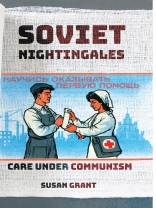In Soviet Nightingales , Susan Grant tracks nursing care in the Soviet Union from its nineteenth-century origins in Russia through the end of the Soviet state. With the advent of the USSR, nurses were instrumental in helping to build the New Soviet Person and in constructing a socialist society.
Disease and illness were rampant in the early 1920s after years of war, revolution, and famine. The demand for nurses was great, but how might these workers best serve the country’s needs? By examining living and working conditions, nurse-patient relations, education, and attempts at international nursing cooperation, Grant recounts the history of the Bolshevik effort to define the ‘Soviet’ nurse and organize a new system of socialist care for the masses. Although the Bolsheviks aimed to transform healthcare along socialist lines, they ultimately failed as the struggle to train skilled medical workers became entangled in politics. Soviet Nightingales draws on rich archival research from Russia, the United States, and Britain to describe how ideology reinvented the role of the nurse and shaped the profession.
表中的内容
Introduction
1. War and Revolution
2. Creating Order Out of Chaos
3. Black Star, Red Star: Finding the Soviet Way
4. Proletarian Paradise: Medical Workers Rise Up
5. Stalinist Care: Cadres Decide Everything
6. Fortresses of Sanitary Defense: Preparing for War
7. A Decade of War and Reconstruction
8. Caring for the Mind
9. Communist Morality, Activism, and Ethics
Epilogue
Coda
关于作者
Susan Grant is a Reader in Modern European History at Liverpool John Moores University. She is the author of Physical Culture and Sport in Soviet Society.












